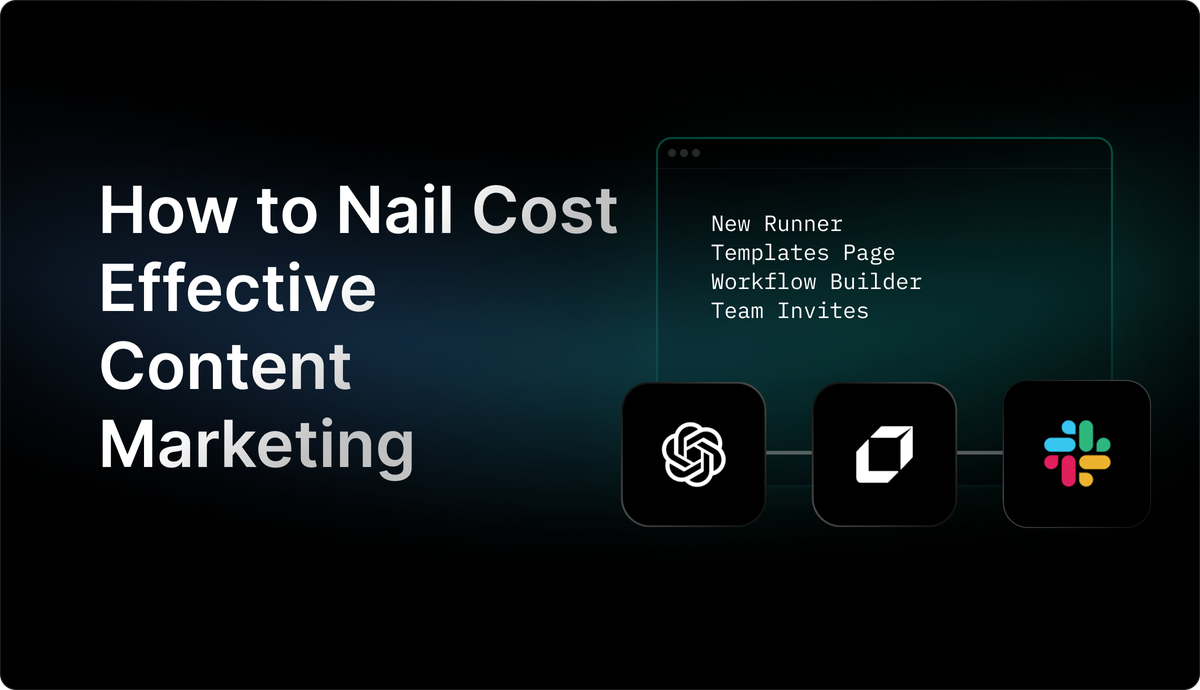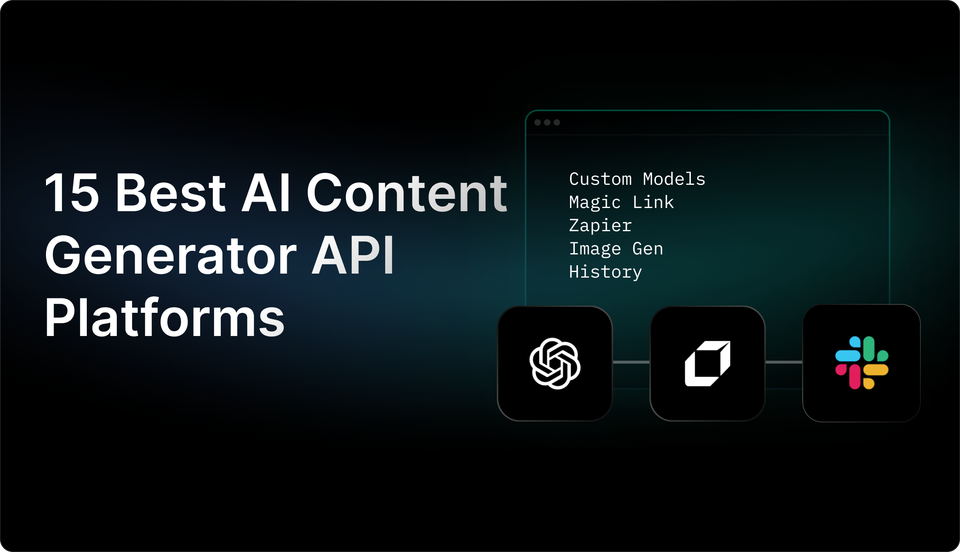How to Nail Cost Effective Content Marketing (Tips & Top Tools)
Learn to maximize your content marketing efforts without breaking the bank. Get tips and top tools for cost-effective content marketing success.

Looking to boost your brand's online presence without breaking the bank? Explore the world of cost effective content marketing! This approach to digital marketing offers massive value for its low cost, making it an excellent option for all brands, big and small. Content ideation is a critical part of this strategy, one that often goes overlooked. It helps to generate fresh, creative, and innovative ideas for your content marketing plan - and who doesn't want that? Let's dive in!

Why is Content Marketing Important?

Content marketing is critical in the digital world because it allows businesses to connect with their audience in a more personal and meaningful way. Unlike traditional marketing, which is often interruptive and focused on selling, content marketing is about providing value and building long-term relationships with customers.
For startups and small businesses with limited resources, creating a cost-effective content marketing strategy is essential. By focusing on producing high-quality content that resonates with their target audience, these businesses can compete with larger companies without breaking the bank. Small businesses can leverage content marketing to establish themselves as industry experts, attract new customers, and grow their brand.
Establishing Trust and Credibility through Content Marketing
At the core of content marketing is the practice of building trust and credibility with the target audience. By offering valuable information and resources that address the needs and interests of the audience, businesses can establish themselves as a reliable source of information. This approach helps to build long-term relationships with customers and position the business as a valuable resource within the industry.
Content marketing allows businesses to create content that is tailored to the needs of their audience, leading to a more engaged and loyal customer base. By focusing on creating content that addresses the pain points and interests of the audience, businesses can establish themselves as experts in their field and build a loyal customer base.
Creating Valuable, Relevant Content for Effective Content Marketing
The most important part of content marketing is creating valuable, relevant content that resonates with the target audience and drives conversions. Unlike traditional marketing methods that focus on selling products or services, content marketing is about providing information that helps customers address their challenges.
By creating content that is focused on providing value for the audience, businesses can build trust and establish themselves as a knowledgeable resource. This approach helps to attract new customers and retain existing ones, leading to increased brand loyalty and more conversions.
Effective Content Marketing for Small Businesses
Content marketing is an essential strategy for businesses looking to connect with their target audience in a more meaningful way. By creating valuable, relevant content that resonates with the audience, businesses can build trust, establish credibility, and drive conversions. For small businesses and startups with limited resources, a cost-effective content marketing strategy is essential for competing with larger companies and growing their brand.

Related Reading
- Content At Scale Ai Detector
- Content Marketing Roi
- Social Media Automation
- Ai Content Creation
10 Benefits of Consistent, High-Quality Content Marketing

1. Reaching Interested Audiences
Content marketing enables you to connect with individuals actively seeking information related to your products or services. By appearing in search results or on social media feeds when users express interest in your content, you can engage with a qualified audience genuinely interested in what you offer.
2. Driving Brand Awareness
Consistently sharing valuable and relevant content on platforms frequented by your target audience can increase brand recognition and familiarity. This heightened awareness can be crucial in steering consumers towards brands they are already familiar with when faced with numerous options.
3. Establishing Experience, Expertise, Trust, and Authority
Publishing in-depth guides, case studies, and walkthroughs showcasing knowledge and expertise can help build credibility, trust, and industry authority among your target audience. This can lead to increased trust and long-term relationships with consumers and peers.
4. Ranking in Search Engines for Better Visibility
Creating informative, updated content optimized for search engines can help improve visibility on search results pages, driving traffic and potential customers to your website. An SEO-centered content marketing strategy can help secure top positions for target keywords.
5. Nurturing Your Audience
Content marketing allows you to guide users through their buyer's journey, from initial awareness to the eventual decision-making stage. By offering informative content at each stage of the journey, you can influence consumer decisions effectively.
6. Growing Lead Generation
Expanding your content reach can result in increased inquiries and sign-ups for your products or services. A well-crafted content marketing approach can attract and engage potential customers, driving them closer to a purchase decision.
7. Driving Sales and Revenue
By catering content to consumers at every stage of their decision-making process, you can influence their purchase decisions effectively. Educating consumers and establishing authority in your field can help build trust and drive sales.
8. Monitoring the Competition
Analyzing competitors' content marketing strategies can offer valuable insights into their tactics, messaging, and market positioning. This information can help you make informed decisions about your content planning and strategy.
9. Winning Market Share
Content marketing rewards value creation, allowing smaller companies to compete with larger organizations. By providing valuable content, companies can grow their market share and establish themselves as leaders in their industry.
10. Tremendous ROI
Content marketing offers a high return on investment by generating leads and improving conversion rates at lower costs compared to traditional marketing methods. With minimal expenses involved in content creation and the potential for evergreen content, the ROI of content marketing can be substantial.
Common Challenges With Content Marketing

1. Insufficient Resources
Producing quality content consistently requires time and skill. Many small businesses struggle with content marketing due to a lack of time and budget. This leads to the project management triangle dilemma where good content is slow and expensive, fast content is expensive and poor quality, and cheap content is slow and poor quality.
2. Increasing Competition
Competition for audience attention intensifies as more businesses create content. This results in an arms race to produce better content, which requires more time and money. As audience expectations rise due to increased competition, the pressure to deliver exceptional content consistently grows.
3. Keeping Quality Consistently High
Even large websites with professional writers publish poor quality content at times. Smaller blogs can create excellent content, taking advantage of the opportunity to produce useful, well-written articles. The pressure to constantly publish can make maintaining quality difficult.
4. Shifts in Trends Toward Paid Promotion
Organic social media promotion remains essential, but paid promotion options on platforms like Facebook and Twitter are increasingly valuable. Content marketers may need to invest in paid promotion to reach more people and achieve their goals.
5. Impatience and Unrealistic Expectations
Content marketing results can take years to materialize, leading to impatience from management. This pressure may stem from misconceptions about content marketing and a desire for immediate returns, contrasting with the reality of the process.
6. Maintaining Ambitious Publishing Schedules
The pressure to publish frequently can lead to a focus on quantity over quality. Many resources recommend daily publishing, but this may not be sustainable for all businesses.
7. Focusing Too Broadly (or Narrowly)
Balancing editorial focus between broad topics and narrow niches is challenging. Focusing too broadly may lead to competition with larger publishers, while focusing too narrowly could limit audience growth.
8. Risk Aversion (or ‘Content Comfort Zones’)
Content marketers may stick to what works due to a desire to provide valuable content and achieve results. Replicating successful content projects can lead to homogeneity and avoid trying new, potentially beneficial approaches.
9. Long-Term Sustainability
As more content is produced, sustainability becomes a concern. The benefits of content marketing must outweigh production costs, leading to challenges in maintaining current practices.
10. Content Producer Burnout
Burnout poses a significant challenge to content marketers, impacting both health and content quality. Burnout symptoms include dissatisfaction, disengagement, and sloppy work, potentially harming a brand’s reputation.
11. Difficulty Measuring ROI
Proving the effectiveness of content marketing remains challenging, even with advanced analytics tools. With proper planning, measuring ROI can be less daunting.
13 Strategies for a Cost Effective Content Marketing Strategy

1. Building an Online Following
Building an online following is essential for a cost-effective content marketing strategy. Start by creating a blog and activating social media channels. Consistently post blogs that solve customer problems, avoid overselling, and improve visibility for your brand. Utilize search engine optimization (SEO) for your blogs to generate more leads.
2. Choosing the Right Niche Audience
To market your solutions effectively, target customers who love your product, repurchase it, and refer you to others. Understand their preferences and market to similar customers. Identify what they read or events they attend.
3. Creating Content on the Go
Creating content on a budget involves getting comfortable with generating content on the go. Engage in making short videos, blogs, and sharing authentic stories.
4. Streamlining Your Content Creation Process
Hire a ghostwriter to conduct video interviews on specific topics. Use transcription services to convert these interviews into text. The writer can edit the content, develop social media posts, and seek approval for publication.
5. Focusing on the 'Why'
Create content that emphasizes the 'why' behind your products or services. By showcasing the importance and reasons for using your offerings, your content will stand out and engage customers effectively.
6. Making Content Work for You
Maximize the value of your content by repurposing it across various channels. For instance, cut a webinar into shorter clips for sharing on social media, transcribe it into blog posts, and repurpose it for email newsletters.
7. Being Consistent and Authentic
Maintain simplicity, authenticity, and consistency in your content. Showcase your field experience and share stories that resonate with your audience. Build a strong presence on multiple social media platforms.
8. Integrating Marketing and Branding
Combine marketing strategies with branding efforts to promote your products or services effectively, capture customers’ attention, and drive sales. Branding helps shape your company's identity and fosters customer loyalty.
9. Focusing on Market Research and Strategy
Engage in market research to drive organic growth and create engaging content for your niche audience. Content that resonates with your target audience doesn’t require large marketing budgets.
10. Leveraging User-Generated Content
Encourage customers to create and share content related to your brand on social media platforms. Reward them for their efforts and foster brand awareness through user-generated content.
11. Starting Simple with Authentic Content
Focus on authentic storytelling that conveys the 'why' behind your brand rather than the 'what' or 'how'. Start by sharing relatable stories that create connections with your customers.
12.Repurposing Infographics and Other Content
Reuse high-quality infographics from other creators by providing proper attribution. Relate the data or trends in these infographics to your own experiences to create engaging and cost-effective content.
13. Extracting Content Ideas from Email
Mine your email inbox for blog post and white paper ideas. Review your email archives to find valuable content marketing ideas and insights for creating engaging content.
33 Essential Tools for Cost Effective Content Marketing

1. Leap AI: Automate Your Work with AI
Leap helps you automate your work with the power of AI. It enables you to create custom AI automations, connect tools with AI models, and supercharge your work with no-code automation.
2. BuzzSumo: Discover Trending Topics and Influencers
BuzzSumo helps you find trending topics in your industry, analyze your competition, and find influencers to promote your content.
3. Evernote: Stay Organized and Collaborate
Evernote is a content marketing tool that helps you stay organized, brainstorm ideas, and collaborate with your team across all devices.
4. Kred: Connect with Influencers
Kred helps you build credibility by connecting with influencers who can amplify your message on social media.
5. Trello: Collaborate with Your Team
Trello brings your content marketing team together on one platform, making collaboration easier, even if your team works from different locations.
6. ClickFunnels: Create Sales Funnels
ClickFunnels helps you create sales funnels that turn visitors into leads, increasing your company's average order value without spending hours designing from scratch.
7. Canva: Design Stunning Graphics
Canva is a free tool for creating high-quality images and graphics to accompany your blog posts, making them more appealing to readers.
8. Uberflip: Improve Your Content Experience
Uberflip is a collection of content marketing tools that enhance your site's content experience, lead generation, account-based marketing, and sales enablement.
9. Semrush: Gain Insight into Search Marketing
Semrush provides insights into search marketing, your competitors' keywords, search ads, and organic rankings, guiding your content strategy.
10. MailChimp: Email Marketing and Automation
MailChimp offers email marketing tools and automation features that help increase customer retention and take your content marketing to the next level.
11. GetResponse: Email Marketing Automation
GetResponse uses automation to trigger events or emails based on recipient actions or specific time frames, optimizing your email marketing efforts.
12. MashShare: Boost Social Shares
MashShare provides eye-catching social share buttons that encourage readers to share your posts, increasing your content's reach.
13. Ahrefs: Improve Search Rankings
Ahrefs offers tools to help you rank higher in search results, drive more traffic, and improve your content's performance.
14. Hootsuite: Manage Social Media Posts
Hootsuite helps you manage social media posts across different platforms, saving time and ensuring posts go out at peak engagement times.
15. Grammarly: Enhance Content Quality
Grammarly helps proofread your content for spelling and grammar mistakes, ensuring high-quality, error-free content.
16. InVideo: Create Marketing Videos
InVideo makes it easy to create marketing videos, helping you tap into the power of video marketing to engage your audience.
17. MobileMonkey: Repurpose Content on Instagram
MobileMonkey's Instagram DM tools help drive traffic to your website and create organic Instagram content easily, repurposing your existing content.
18. Yoast: Optimize Your Content for SEO
Yoast integrates seamlessly with WordPress, offering tools to optimize your website and content for search engines and reader experience.
19. SlideShare: Create Visual Content
SlideShare helps you create visual content like presentations and infographics quickly and easily, enhancing your content's visual appeal.
20. MindNode: Visualize Your Ideas
MindNode helps you map out brainstorming sessions and ideas visually, making it easier to understand what works and what doesn't for your content strategy.
21. GIMP: Design Visuals for Your Content
GIMP is a free image editing software like Photoshop, allowing you to create visuals for your content needs easily and without cost.
22. Issuu: Create Online Magazines
Issuu helps you create visually striking online magazines and lookbooks, offering customizable content experiences for your readers.
23. Hemingway: Improve Content Readability
Hemingway App identifies errors affecting your content's readability, helping you enhance your content to meet the highest standards.
24. Visually: Create Infographics and Data Visualizations
Visually offers a marketplace of infographic to help you create stunning infographics and data visualizations for your content.
25. Loom: Manage Video Content
Loom is a free screen recorder that helps you manage and share video content effectively, streamlining your video marketing efforts.
26. Google Analytics 4 (GA4): Optimize Marketing Strategies
GA4 offers new analytics tools to help you measure and optimize your marketing strategies better, providing machine-learning abilities and automatic alerts on user behavior changes.
27. Ceros: Engage Your Audience
Ceros helps you create interactive content like pitch decks, landing pages, and quizzes to engage your audience further and enhance your content marketing efforts.
28. Quora: Discover Relevant Topics
Quora helps you find and answer your audience's burning questions, discover new topics to write about, and stay updated on the latest trends in your industry.
29. Basecamp: Simplify Workload and Communication
Basecamp is an all-in-one project management platform with features to simplify your workload, improve communication, collaboration, and productivity.
30. Ubersuggest: Optimize Content for SEO
Ubersuggest provides keyword suggestions, competitor analysis, and backlink analysis to help you optimize your content for search engines and improve your SEO strategy.
31. ContentShake AI: Enhance Content Expertise
ContentShake AI helps you add relevant knowledge and expertise to your content, ensuring it stands out and resonates with your audience.
32. QuestionDB: Answer Audience Questions
QuestionDB helps you find and answer your audience's burning questions, guiding your content creation and making sure you provide valuable information.
33. Mixkit: Access Free Stock Videos
Mixkit offers hundreds of free HD stock videos to use in your marketing content, eliminating the need to hire a camera crew and providing quality video content for your audience.
Related Reading
- Content Scaling
- Content Automation
- Content Workflow
- Content Marketing Automation
- How To Make Ai Content Undetectable
- How To Train Chatgpt To Write Like You
- Content Marketing Workflow
- Best Instagram Automation
- Ai Powered Content Creation
- Ai Content Optimization
- Content Planning For Social Media
- Ai Content Management
- Ai And Content Marketing
- Content Production Process
- How To Automate Content Creation
- Automate Blog Posts
7 Ways to Prioritize Quality in Cost Effective Content Marketing

When it comes to content marketing, quality is paramount. High-quality content is not just about words on a page but rather about creating content that is relevant, engaging, and valuable for your audience. To ensure high-quality content, it is essential to have a deep understanding of the topic you are discussing, your target audience, and the industry in which you operate.
1. Address Your Customers' Needs
The first step in creating high-quality content is to address your customers' needs effectively. This means understanding your audience's motivations, pain points, and preferred channels and platforms. By developing in-depth customer profiles, or buyer personas, you can tailor your content to meet the specific needs of your target audience.
2. Align Content with Your Business Goals
When creating content, it is crucial to align it with your business goals. Content should be created with the intention of generating business outcomes, such as sales or leads. Understanding your content marketing goals and prioritizing the pieces with the highest potential for return on investment is key to maximizing the effectiveness of your content marketing efforts.
3. Showcase Your Expertise
Creating content that showcases your expertise or involves subject matter experts can greatly enhance the quality of your content. Subject matter experts bring depth and trustworthiness to your content, making it more valuable and engaging for your audience. Involving skills in your content creation process can help differentiate your content from the vast amount of content published daily.
4. Find the Right Formats
Choosing the right format for your content is essential for ensuring its success. There are many formats to choose from, including blog posts, social media posts, downloadable assets like ebooks, podcasts, and more. By conducting adequate research, such as a competitive analysis, you can determine the formats that work best for your target audience and industry.
5. Ensure Content Readability
To engage users effectively, it is crucial to ensure that your content is easily readable. This includes writing short sentences, using one idea per paragraph, incorporating images to break up text, using lists, and sharing relevant information early in your content. Content readability is especially important for text-based content like blog posts and ebooks.
6. Update Your Content
Regularly updating your content is important for ensuring its relevance to users and search engines. Outdated content is less likely to generate business outcomes like sales and leads. Tracking content decay, especially for blog posts, is crucial for maintaining the quality and effectiveness of your content marketing efforts.
7. Learn from Content Performance
Measuring your content's performance is essential for creating high-quality content. By analyzing your content's performance, you can identify underperforming content, improve it, and apply learnings to future content. Choosing key performance indicators (KPIs) based on your goals allows you to track your content's performance effectively and ensure that it is meeting your objectives.
Create Game Changing Automations Today With Leap’s AI Workflows
One of the most powerful tools in any marketer’s toolbox is automation. Automating repetitive, time-consuming tasks can give you a significant edge in creating cost-effective content marketing strategies. Embracing the power of AI can help you supercharge your efforts and maximize your resources. By harnessing tools like Leap, you can automate tasks from content creation to SEO optimization, freeing up your time to focus on creating engaging, high-quality content.
Maximize Your ROI with AI-powered Content Creation
Creating high-quality, engaging content is the cornerstone of any successful marketing strategy, but it can be incredibly time-consuming. By leveraging AI-powered tools like Leap, you can automate tasks like summarizing documents, voice translation, and AI avatar generation to create content faster and more efficiently. This not only frees up your time to focus on more high-impact tasks, but it also ensures that you can consistently produce high-quality content that resonates with your audience.
Boost Your SEO with AI-driven Automation
SEO is crucial for ensuring that your content reaches the right audience, but it can be a complex and time-consuming process. AI can help you streamline SEO optimization by automating tasks like keyword research, content optimization, and link building. By incorporating AI-driven automation into your SEO strategy, you can ensure that your content ranks higher in search engine results pages, driving more organic traffic to your site and maximizing your ROI.
Automate Cold Email Creation and Sending Processes
Cold email outreach can be a powerful tool for connecting with potential customers, but creating and sending individual emails can be incredibly time-consuming. Leap's AI-powered tools can help you streamline this process by automating cold email creation and sending. By leveraging AI automation for your cold email outreach, you can personalize your messages at scale, reach more potential customers, and drive higher conversion rates.
Enhance Your Content Marketing Strategy with AI Workflows
AI Workflows from Leap offer a wide range of automation opportunities that can enhance every aspect of your content marketing strategy. From summarizing documents to voice translation, AI call transcription to AI avatar generation, and even automating SEO optimization tasks, the possibilities are endless.
By leveraging Leap's AI Workflows, you can supercharge your content marketing efforts, drive higher ROI, and create more engaging and impactful content.
Related Reading
- Midjourney Alternatives
- Ai Content Creation Tools
- Best Linkedin Automation Tools
- Social Media Automation Tools
- Content Automation Tools
- Writesonic Alternative
- Copy Ai Alternatives
- Jasper Ai Alternative
- Rytr Alternatives
- Wordtune Alternatives
- Ai Content Generator Api
- Content Automation Services
- Frase Alternative




